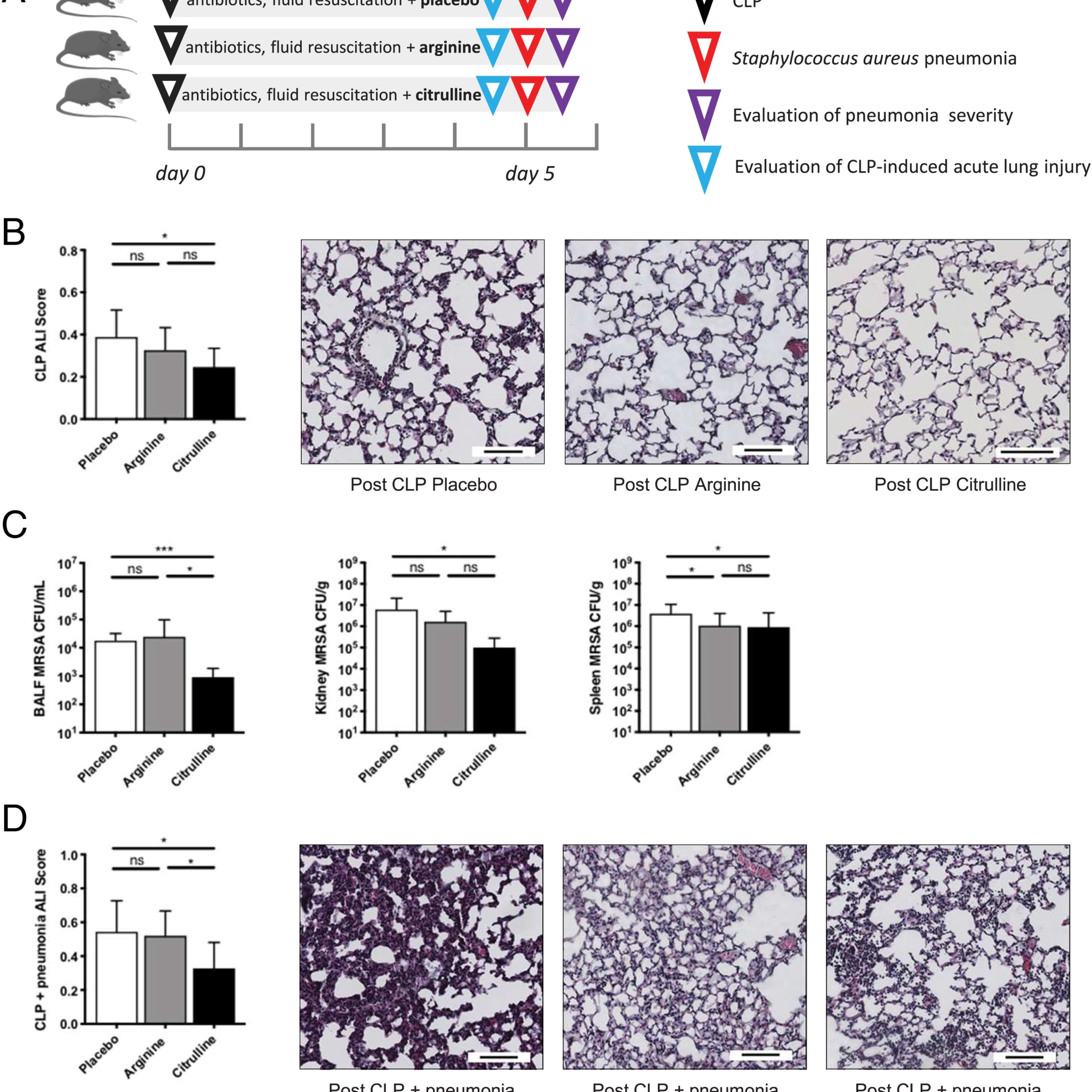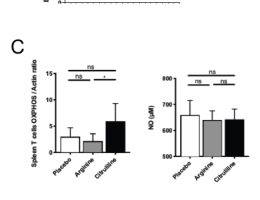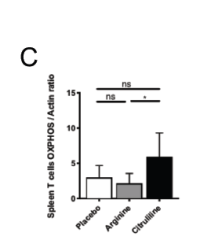Citrulline looks like the best amino acid for acute use in infections to replenish immune markers
A lot of viruses try to upregulate arginase in our bodies to shift more arginine into ornithine & urea - to lower protective immunity of the host .
which is also seen in covid where Arginase activity gets upregulated more than 2 fold . so this is clearly key in viral infections
Using citrulline is an effective way to get around the increase in arginase activity , which navigates around different mechanisms during sepsis or viral infections, increases arginine levels better than arginine alone, and helps restore immune cells , immune function better. at a low dose.
enteral citrulline administration (mice dose 150 mg/kg/day for 5 d)



Although mechanisms responsible for MDSC-mediated immunosuppression in sepsis remain to be exhaustively described, MDSC-induced arginine depletion through arginase-1 activity has been clearly identified in septic patients. Fletcher et al. found that L-arginine deprivation induced the accumulation of MDSCs, which inhibited T cell proliferation in mice
One beneficial role Vitamin D3 has in immunity is decreasing the effect MDSC "suppressor cells" have in inhibiting T Cells,
which functions in large part by arginine depletion through MDSCs increasing the arginase 1 enzyme.
So if someone is low on Vitamin D , considering vitamin D takes a while to get up for immune benefits ,
decreasing MDSC suppressor cells effectiveness with citrulline should be greatly beneficial for immunity short term during illness.

 pubmed.ncbi.nlm.nih.gov
pubmed.ncbi.nlm.nih.gov
**
150mg/kg in mice by stomach= ~750mg - 1g human dose (empty stomach)
a good thing about this study is it shows this works at low dose & by just 5 days.
which is probably insignificant in terms of nitric oxide increase if any. in this study in vitro assessment of t cells showed slightly lower NO production.
while getting a significant boost during illness when arginine is being depleted, and instead increasing t cell proliferation / mitochondria function / overall survival
highest food sources: 1 cup of red flesh watermelon might have ~150mg per cup. or ~400mg for yellow flesh watermelon
A lot of viruses try to upregulate arginase in our bodies to shift more arginine into ornithine & urea - to lower protective immunity of the host .
which is also seen in covid where Arginase activity gets upregulated more than 2 fold . so this is clearly key in viral infections
Using citrulline is an effective way to get around the increase in arginase activity , which navigates around different mechanisms during sepsis or viral infections, increases arginine levels better than arginine alone, and helps restore immune cells , immune function better. at a low dose.
enteral citrulline administration (mice dose 150 mg/kg/day for 5 d)
Beneficial effects of citrulline enteral administration on sepsis-induced T cell mitochondrial dysfunction
Using an animal model of sepsis, we demonstrated that increasing arginine availability enhanced mitochondrial T cell function and decreased sepsis-induced immunosuppression
Severe sepsis induces a sustained immune dysfunction associated with poor clinical behavior. In particular, lymphopenia along with increased lymphocyte apoptosis and decreased lymphocyte proliferation, enhanced circulating regulatory T cells (Treg), and the emergence of myeloid-derived suppressor cells (MDSCs) have all been associated with persistent organ dysfunction, secondary infections, and late mortality.
we demonstrated that citrulline administration was more efficient than arginine in increasing arginine plasma levels and restoring T cell mitochondrial function and proliferation while reducing sepsis-induced Treg and MDSC expansion.

several data suggest that mechanisms involved in MDSC-mediated T cell dysfunction shared some features with those described in malignancies, including arginase-induced arginine depletion that could be responsible for T cell mitochondrial dysfunction and enhanced apoptosis
early enteral administration of arginine in critically ill patients mainly enhanced ornithine synthesis, suggesting a preferential use by the arginase pathway, while nitric oxide synthesis was barely stimulated, and immune functions were unaffected
Recently, several studies have found that supplementation with citrulline, which is converted in arginine through the activity of argininosuccinate synthase and argininosuccinate lyase and does not undergo first-pass metabolism, was more efficient than arginine to increase the plasma level of arginine
Our study highlights a promising role for citrulline administration during sepsis to restore immune functions through maintaining plasma arginine levels, preserving T cell mitochondrial function, and decreasing the severity of sepsis-associated lung injury and the severity of secondary infection.
Although mechanisms responsible for MDSC-mediated immunosuppression in sepsis remain to be exhaustively described, MDSC-induced arginine depletion through arginase-1 activity has been clearly identified in septic patients. Fletcher et al. found that L-arginine deprivation induced the accumulation of MDSCs, which inhibited T cell proliferation in mice
One beneficial role Vitamin D3 has in immunity is decreasing the effect MDSC "suppressor cells" have in inhibiting T Cells,
which functions in large part by arginine depletion through MDSCs increasing the arginase 1 enzyme.
So if someone is low on Vitamin D , considering vitamin D takes a while to get up for immune benefits ,
decreasing MDSC suppressor cells effectiveness with citrulline should be greatly beneficial for immunity short term during illness.

1α, 25 Dihydroxyvitamin D (1,25(OH)2D) inhibits the T cell suppressive function of myeloid derived suppressor cells (MDSC) - PubMed
Myeloid derived suppressor cells (MDSC) suppress the ability of cytotoxic T cells to attack and clear tumor cells from the body. The active form of vitamin D, 1,25 dihydroxyvitamin D (1,25(OH)<sub>2</sub>D), regulates myeloid cell biology and previous research showed that in mouse models 1,25(OH) …
Arginase converts L-arginine to L-ornithine and urea. In normal conditions, arginine is synthesized de novo and therefore not diet dependent (29, 30). However, enhanced arginase activity during critically ill states is responsible for a significant decrease in arginine availability that becomes essential once endogenous arginine synthesis is exceeded
This arginine deficiency strongly contributes to T cell dysfunction. The shortage of L-arginine inhibits T cell proliferation through several mechanisms
Conversely, decreasing L-arginine availability induced a drop in intracellular L-arginine along with altered mitochondrial function highlighted by the significant decrease in the OCR
We showed in this study that increasing arginine availability was associated with increased mitochondrial oxidative phosphorylation on the basis of the OCR, along with enhanced proliferation and decreased T cells apoptosis, although we failed to increase the expression of the CD3 ζ-chain
As several studies have shown that mitochondrial energy generation determined the survival and the effectiveness of T cells
**
they compared the efficiency of L-citrulline versus L-arginine supplementation to relieve the proliferation arrest induced by increased arginase-1 activity and found that only L-citrulline restored the proliferation of T cells cultured in the presence of arginase-1
we demonstrated that critically ill states were associated with arginine deficiency and that early enteral administration of L-arginine increased ornithine synthesis, suggesting preferential use by the arginase pathway
Citrulline is an amino acid that could be transformed into arginine by the arginine–succinate synthase, and several studies have shown that citrulline supplementation served as an arginine precursor more productively than arginine itself in catabolic situations such as sepsis for several reasons. Among those, citrulline is not subject to first-pass metabolism, whereas arginine is largely extracted in the liver, and arginine–succinate synthase colocalizes with nitric oxide synthase. Accordingly, in our study, citrulline administration increased arginine plasma levels in septic mice, while arginine did not
Noteworthy, the enteral administration of higher doses of arginine or citrulline such as 300 mg/kg has been found to induce adverse gastrointestinal effects without a significant increase in arginine plasma concentration
150mg/kg in mice by stomach= ~750mg - 1g human dose (empty stomach)
a good thing about this study is it shows this works at low dose & by just 5 days.
which is probably insignificant in terms of nitric oxide increase if any. in this study in vitro assessment of t cells showed slightly lower NO production.
while getting a significant boost during illness when arginine is being depleted, and instead increasing t cell proliferation / mitochondria function / overall survival
highest food sources: 1 cup of red flesh watermelon might have ~150mg per cup. or ~400mg for yellow flesh watermelon
Attachments
Last edited:


